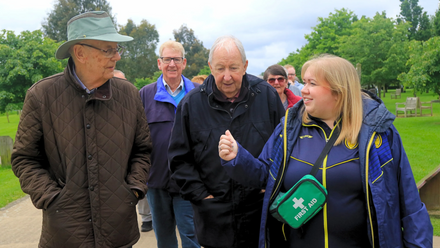Jobs market improves in the Midlands - survey

The latest KPMG and REC UK Report on Jobs survey, compiled by S&P Global, saw the number of permanent staff placements rise across the Midlands for the first time since November 2023.
Though the increase was only marginal, it was the only rise seen across the four monitored English regions. The picture for temp billings also improved.
Vacancies for permanent roles rose at a marginal, but slightly quicker rate in May, while the increase in temporary job openings lost momentum. An increase in demand for staff fuelled a further rise in starting salaries and temp pay rates in May, though only the latter saw pay growth accelerate.
The KPMG and REC, UK Report on Jobs: Midlands is compiled by S&P Global from responses to questionnaires sent to around 100 recruitment and employment consultancies in the Midlands.
The number of staff placed into permanent roles rose across the Midlands, ending a five-month run of decline. Recruiters linked the renewed uplift to increased demand for permanent staff.
May data saw the number of billings received for the employment of temporary staff increase for the second month in a row across the Midlands. Survey respondents cited an improvement in demand for temp workers, while others mentioned a rise in candidate availability. While only modest, the uplift was the sharpest for three months.
May survey data also pointed to a third consecutive monthly rise in demand for permanent staff across the Midlands.
Temp vacancy growth was sustained in May. However, the rate of expansion was the softest for four months and remained historically subdued.
The seasonally adjusted Permanent Staff Availability Index signalled a fourteenth consecutive monthly rise in permanent candidate numbers in May.
Temp staff availability across the Midlands picked up again in May, as has been the case for just over a year. Recruiters mentioned an increased willingness among candidates to accept temporary contracts. Though easing from April, the rate of growth in temp staff supply was solid.
Recruiters across the Midlands continued to record an increase in starting salaries in May, thereby stretching the current sequence of uplifts which began in March 2021.
Average hourly pay for short-term staff continued along an upward trend midway through the second quarter. The rate of temp wage growth was substantial and the most pronounced in 2024 so far. According to anecdotal evidence, the uptick followed a rise in demand for temporary workers. Only the North registered a sharper rise in temp wages than that seen locally.
Kate Holt (pictured), people consulting partner for KPMG in the Midlands said: “This month’s data suggests local employers are slowly taking the brakes off of recruitment freezes and are looking to get their businesses moving again.
“The Midlands was the only region in the UK that recorded an increase in the number of people getting into permanent work which suggests green shoots of jobs recovery are on the horizon.
"With starting salaries rising, local businesses are prepared to pay a premium to get the right skills into their businesses in order to kickstart growth.
"The business environment remains challenging, but as the economy slowly improves, and with the General Election now called which will provide the stability businesses need to start investing again, business confidence is turning a corner.”
Neil Carberry, REC Chief Executive, said: “There is potential energy stored in the economy, as employers are feeling more confident. Political certainty and falling interest rates should add to lower inflation and help this turn into movement over the course of the rest of the year. REC members report that clients are ready to hire, but hesitant.
“Pay growth remains steady, reflecting both settlements made by employers for their staff, but also the substantial National Minimum Wage rise in April.
“No attempt to drive growth will succeed without the next government addressing people issues within its first 100 days.
“This must include reform of the Apprenticeship Levy to cover high-quality, modular training, and a long-term cross-departmental strategy to tackle labour and skills shortages, owned by the Cabinet Office but delivered locally.”



